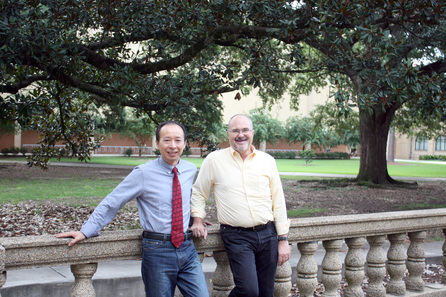 Dr. Bickmore and Malcolm Duan pose together on LSU's campus.
Dr. Bickmore and Malcolm Duan pose together on LSU's campus. Well, this happened to me last week. I had some wonderful conversations with Haipeng (Malcolm) Duan. Obviously, Malcolm is his selected English name. He explained to me that he liked the Scottish heritage of the name and he felt that it was unique. He didn’t what to be another Chinese academic known by David, John, or Michael.
Malcolm was on his first trip outside of his native China. He selected Baton Rouge, in part, because through his internet search, the city has a reputation as a friendly place with a major university. Furthermore, it sits on the famed mighty Mississippi River. Now, imagine his bravery, his willingness to risk, as he contacted me through email. I know, everyone is thinking: “Bickmore, are you crazy responding to an introductory email from a foreign country?” Well, maybe, but this one felt right and my son, Walker, speaks fluent Mandarin (He says he is fluent, so I am always looking for opportunities to test him). Malcolm also mentioned, from the very beginning, that he was traveling at his own expense. I followed up by asking for links to his university, Teachers College of Guilin—here is a very helpful link if you speak Chinese.
Initially, our face to face connection was delayed. I left Baton Rouge for vacation as he arrived. We connected last week and discussed what English Education means for both of us. For me, it is the education of teachers who will teach reading, writing, speaking, and listening skills to native speakers of English—primarily. For Malcolm, it means teaching English to native Chinese speakers in their public schools. He taught English for ten years in a high school setting and now works with pre-service teachers preparing to teach English in Chinese schools.
I have arranged for Malcolm to visit several schools in the Baton Rouge area—that is a completely different posting for another time.
As I explained my interest and work around Young Adult Literature, I wanted to offer some concrete examples. I gave him several copies of The ALAN Review—all three issues of volume 41. Sorry, they aren’t online yet. The information about the journal under the new editorial team of Wendy Glenn, Ricki Ginsberg, and Danielle King can be found here. In addition, archived issues can be found here and the journal’s Facebook page here.
I then wanted Malcolm to have some concrete examples of established YA titles—Okay, before you read further, what ten books would you offer up as established, quality YA fiction if money and availability is not an obstacle. Quick, are they on your shelves? Make a list and send it to me or post it on Facebook as a response to this blog posting.
I selected two familiar texts. I have to admit that they were both included as part of the discussion in a special issue of First Opinions, Second Reactions (FOSR V7, I1) By the way, share this around as it is a good journal and this is an interesting issue. These novels and a few others have been on my mind over the last six months as a result of this project. The first was The Outsiders by S. E. Hinton. I like the way the book troubles the American Dream and discusses how we separate ourselves by economic lines in this country. I also like how Jennifer Dail and Sophia Tatiana Sarigianides discuss the novel in their contribution to the special issue of FOSR-Discussing the Classics of Young Adult Literature. For me, The Outsiders remains a book that still speaks to students and marks a moment for the acceptance and growth of YA literature.
I would have been amiss if I hadn’t offered a YA novel that dealt with the issue of race in the landscape of American Culture. Like you, I bemoan the tragic event in Ferguson, Missouri. Clearly, we haven’t made all of the progress we think we have in a society that people too quickly want to label as post-racial. Two articles focus on past and current statements by President Obama. First, the Washington Post a few days ago, and second, was posted yesterday in the GlobalPost.
My second choice was The Watsons Go to Birmingham—1963 by Christopher Paul Curtis. I love this book. I think I see myself in Kenny as he innocently plays with toy soldiers. Kenny’s journey is one from naiveté to a clearer understanding that violence might explode out of our prejudices. Again, I appreciate how both KaaVonia Hinton and E. Sybil Durand treat the novel in their brief essays in FOSR.
For the time being, Malcolm has a couple of quality examples of YA literature that might give him a slightly broader picture of American adolescence. What else should I offer? I realize now that it might be a more difficult task than I imagined explaining YA literature to a foreign “English Educator.” What he is able to take with him as he reenters China, might be an issue as well. We imagined an interchange in which his future pre-service teachers read the same YA novel that my students might read as a touchstone text in a methods class to use in practicing and discussing teaching strategies. Would either one of these texts provoke an exchange of questions between his future English teachers in China and my students in Baton Rouge, Louisiana? What would these novels say about equality, race, culture, and education? Well, I hope we get to find out.
I would love your collective wisdom about what we should consider as we move forward. Don’t forget to send me your list of ten YA novels to share internationally.
Until next week,
Steven T. Bickmore


 RSS Feed
RSS Feed